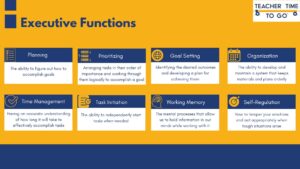So, by now, you have heard of the term, Executive Functioning. It is one of the latest buzzwords in education. While it has recently gained quite a bit of attention, Executive Functioning has been around FOREVER. It just never really had a formal term until lately. I have heard so many definitions of Executive Functioning over the years but the one that I go with is the simple answer: the skills we use every day to learn, work and manage daily life. You can think of the term as the skills required to execute tasks.
Here at TT2G, we are working with about 500 families in the local community and approximately 75% of those families request some sort of Executive Functioning Support. So this set of skills is a highly sought after service.
This is the introduction overview of an 8-part series highlighting Executive Functioning Skills. You will find definitions, parent recommendations and strategies that can be implemented for immediate support at home for families and in the classroom for teachers.
My hope is that by helping you to understand what Executive Functioning is versus what it is not, it will paint a more clear picture.

Executive Functioning IS:
- Something that is needed at every stage of life. As early as the toddler stage you can recognize it by watching children following simple directions. For elementary and middle school students, you’ll see it demonstrated as they complete assignments, and in high school and college as the students juggle busy schedules. It continues into adulthood with managing daily life for oneself and others.
- Developed with practice and repetition. It is not something that can be heard once and then expected to be fully grasped. It needs to be explained, modeled, practiced, and reflected on, to show improvement and success.
- Interconnected. You will see in our series that there are 8 major Executive Functions and they are all intertwined in some way or another.
Executive Functioning is NOT
- Laziness. I mean it could be if your child would rather watch tv then get their homework done, but many times, the lack of motivation is due to low Executive Functioning skills which produces negative emotions towards completing a task. We will get to the root of this as we proceed.
- Acting out. A lot of times a lack of EF skills presents itself as irritable or oppositional behavior. As a classroom teacher, there were so many parent-teacher conferences where parents would say to me, “Oh, my daughter doesn’t do that here? They do that at home all the time!”
- Genetic. It is not hereditary. But, it is learned behavior that directly correlates to their environment. Hence, while many parents may think they passed this along, that is not the case. Children learn by being exposed. This is the classic nature vs nurture debate.
- NOT your fault! While you may think “Oh this is how I am, so of course my son is going to misplace his items too!” Just know that is it not your fault. But, it is your time to learn some strategies to help and support!
There are 8 Executive Functions that we are going to highlight in the series. As mentioned earlier, many of these are interrelated and connected in some way or another. The big 8 are:
- Planning
- Prioritizing
- Goal Setting
- Time Management
- Organization
- Task Initiation
- Working Memory
- Self-Regulation

Next week we will be sharing the first of the Executive Functioning Skills that we will dive deep into: Planning! We will go into detail about each of these with a specific (user friendly definition) and support strategies! If you want to review the other posts in the series, you can find them here: Planning, Prioritization.
Have a definition of Executive Functioning that makes sense to you? We’d LOVE to hear it!
Live.Laugh.Learn,
Jenn

